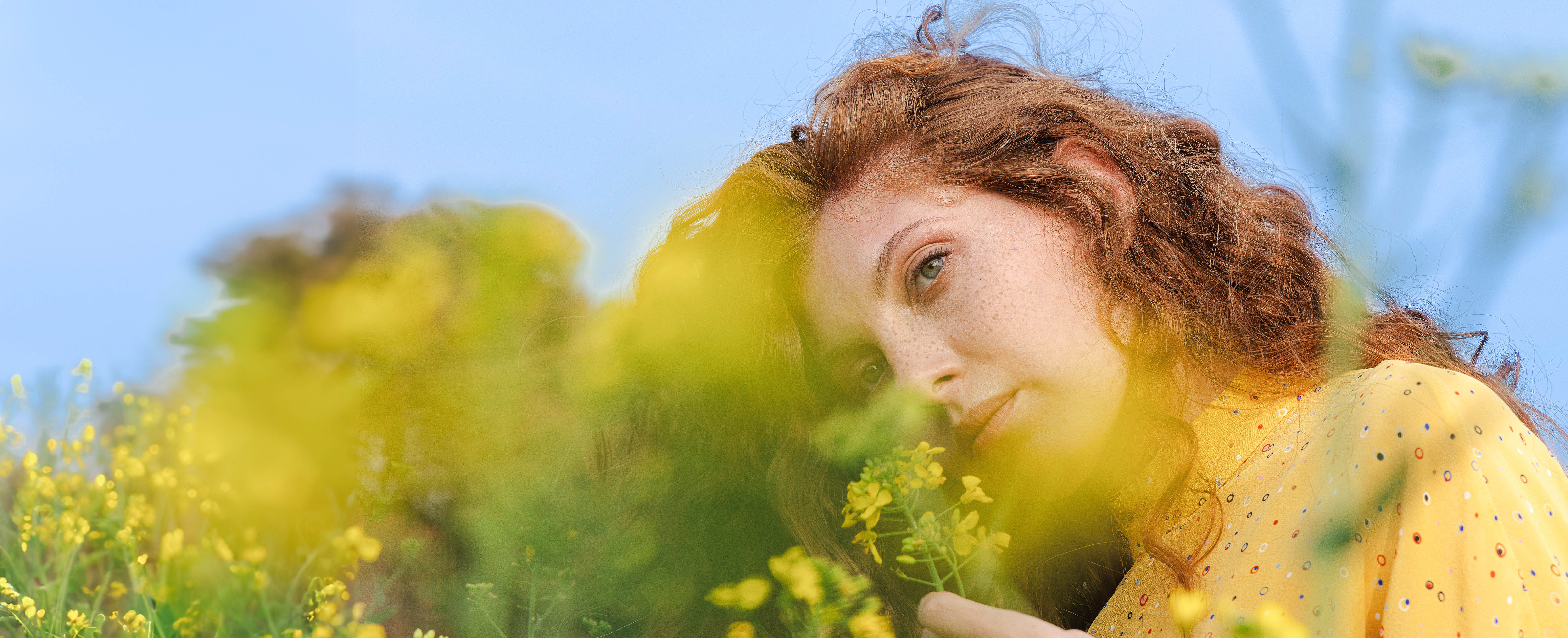How we do it
Since day one, we have been committed to creating a new paradigm for business, in which profit and purpose are intrinsically linked, creating a business as a force for good. With the aim of disrupting the market and offering a high-quality, ethical alternative, we committed ourselves to researching, testing and using materials that have the lowest possible environmental impact.
Over time, we have proved that a beautiful object doesn’t have to come at the expenses of other living beings or our planet. With creativity and compassion, we have proved that it is possible to have fashion without fashion victims.
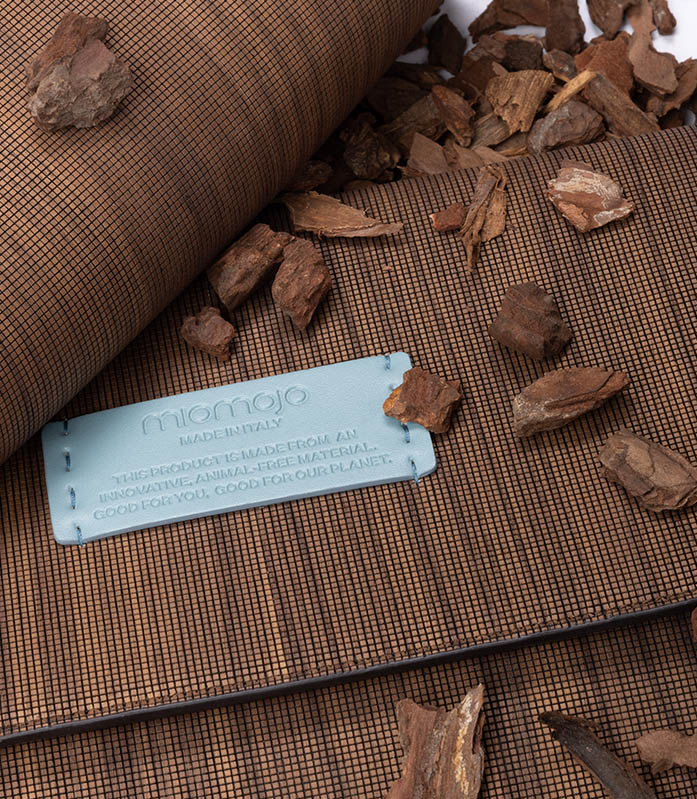
FASHION, WITHOUT FASHION VICTIMS
We are the Next Generation
All our accessories are, of course, cruelty-free, but they are also recycled and up-cycled and – using the entire range of incredibly innovative, next-generation materials – derived from plant-based resources, rather than animal-derived and fossil-based alternatives.
We proudly use materials that are partially organic, made from apple waste, cactus and pineapple, as well as fabrics with a high bio content, with biopolyols that originate from non-food and GMO-free grains.
Nonetheless, this is just an intermediary step: we are working together with amazingly innovative companies to use lab-grown materials that put us on a path towards a more sustainable future.
These materials are neither animal- nor petroleum-based, and they have an incredibly low impact as well as the potential to change the whole way we produce lifestyle products, disrupting forever the status quo of unsustainable practices.
This is the time for evolution towards kindness, and it begins in nature.
Designed kind,
with innovative material.
A CLOSER LOOK TO
Our materials
For us, materials that cause deforestation and loss of biodiversity and which therefore endanger species are unacceptable.
Wasteful processes must become things of the past. Total ethics fashion is not a heavy contributor to the climate crisis.
This is the reason why we have never and will never use animal-derived materials.
Through innovation, cruelty and wastefulness can be made redundant. By supporting only new materials and modes of operating in fashion, we move closer to a totally ethical system. With so many genuinely ethical and sustainable choices out there,
why would you not choose them?
MADE FROM
Apples
AppleSkin recovers apple processing waste (the woody part and the peel) produced in South Tyrol, Italy. The discarded parts of the apple are dried and milled into a very fine powder.
This is mixed with roughly 40 percent polyurethane (PU) and applied to a tear-resistant roll of cotton fabric. The roll is then heated to produce a weather-resistant, durable fabric.
Finally, the fabric is embossed to allow for different surface textures. And that’s it: this is how UppealTM is created.
This innovative material is the perfect replacement for similar materials (petroleum derivatives), but has a partially organic composition made from organic waste. The carbon footprint of polyurethane is around 5.28 kg CO2 eq/kg PU, compared with apple waste recovery, which is considered to have zero impact.
This represents a saving of 5.28 kg CO2 per kg apple waste used to replace PU.

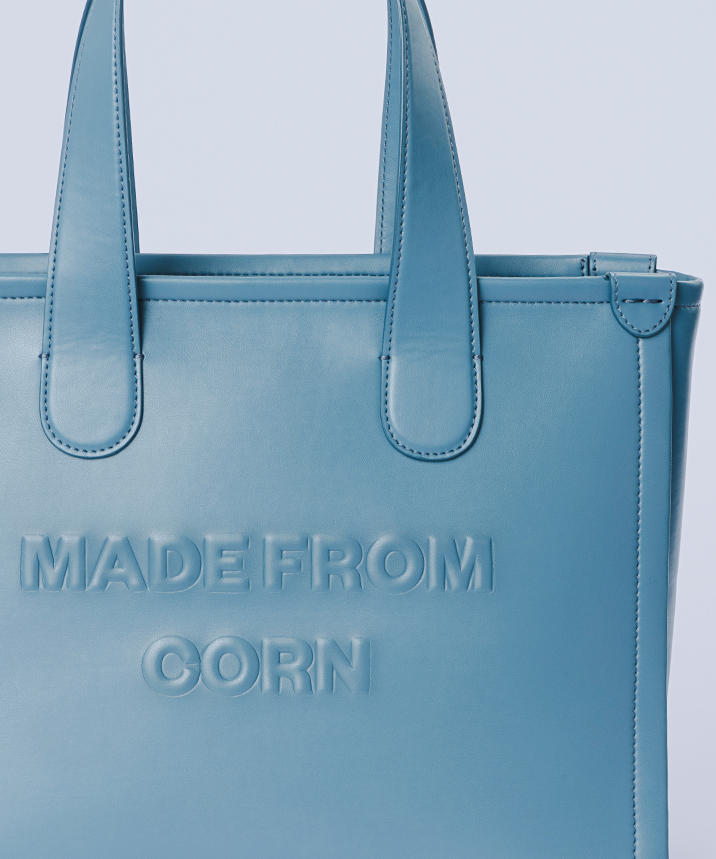
MADE FROM
Corn
This material, a BioVeg alternative, is supple and highly durable. It has been created using biopolyols that originate from non-food and GMO-free grains combined with textiles sourced from natural or recycled materials. The raw materials are FSC-certified viscose or GRS post-consumer recycled polyester.
Cereals are grown in industrial plantations. Harvested corn and wheat are shredded, which produces a vegetable liquid that is used in the production of biopolyols, the basis of Bio PU.
Bio PU is coagulated with recycled polyester from plastic bottles, it is washed to extract solvents and then coated with biopolyols.
The product lifecycle analysis (LCA) demonstrates how these BioVeg, innovative materials are more sustainable for health, quality of the environment, use of natural resources and impact on climate change.

MADE FROM
Cactus
Cactus “leather” is a highly sustainable, plant-based material made from cactus. The cactus plantations are completely organic: they require no pesticides nor herbicides. They are perennial, which means that sowing takes place only once, and the lifecycle of the plantation lasts up to 8 years. The cacti grow and feed thanks to rainwater and minerals from the ground, resulting in huge water savings.
Only the mature leaves of the cactus are harvested, cleaned and mashed. Then they are dried under the sun for three days. After this, the dried material is mixed with non-toxic chemicals. It is then shaped and given colour and texture.
All the discarded material from organic production of the cactus is exported and sold to the food industry.

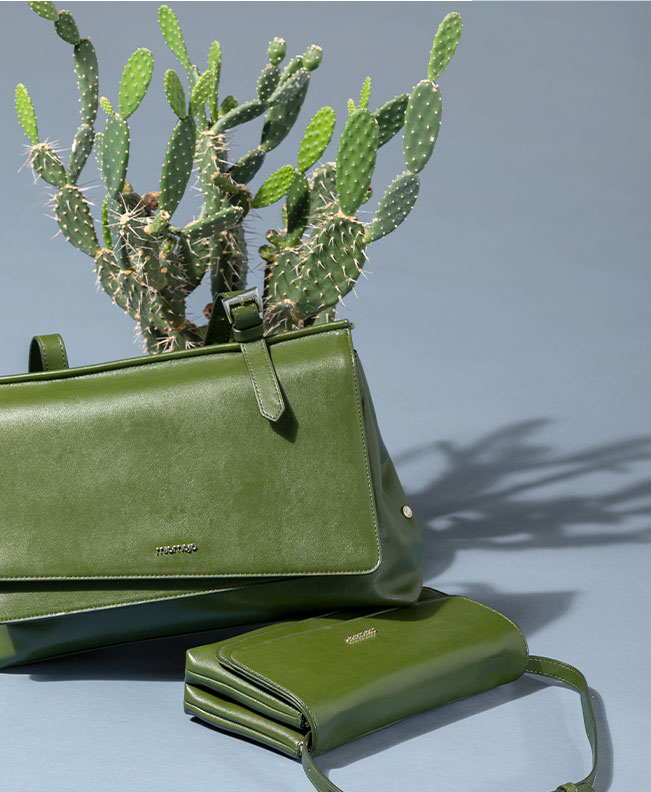
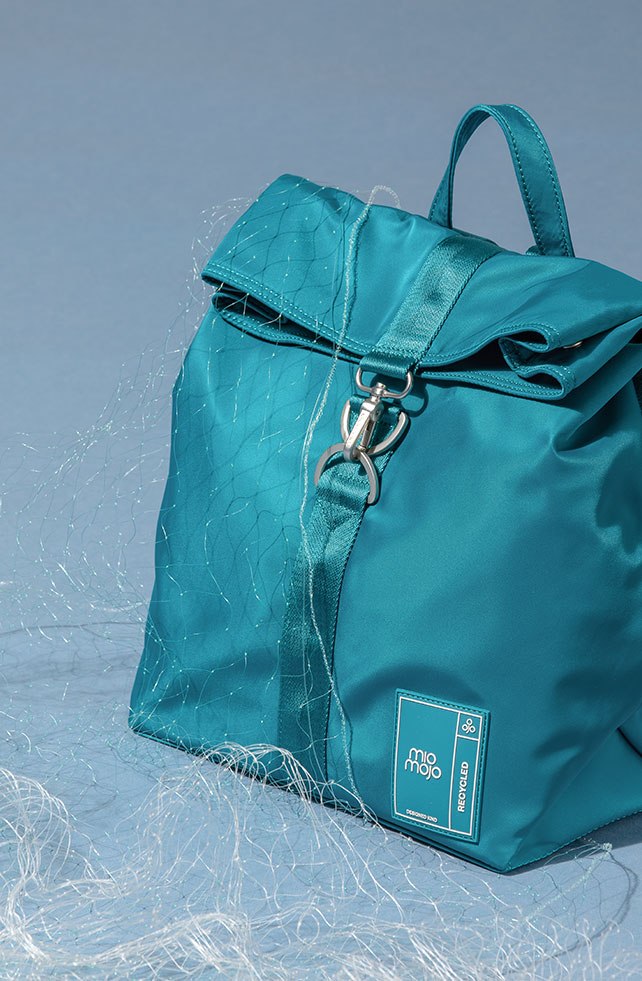
MADE FROM
Recycled nylon from ghost nets
A ghost net is a fishing net that has been lost or abandoned at sea. Fishing nets abandoned in the oceans are a major contributor to the ocean plastic crisis. Most modern nets are made of nylon or other plastic compounds, which can last for centuries. According to a 2018 study in Scientific Reports, ghost nets make up at least 46 percent of the Great Pacific Garbage Patch.
Those abandoned fishing lines and nets that do breakdown never go away; they just become smaller pieces of plastic. Marine animals mistake this microplastic for food and eat it, which can harm their internal organs, keep them from eating and expose them to toxic chemicals.
Or the ghost nets can be taken out of the oceans and recycled to create a wonderful material to make resilient, high-quality backpacks and bags. The collected ghost nets are cut into smaller pieces and the recycled nylon chips obtained from this, are used to create the re-new yarn, which is woven knitted into various fabrics.
The quality of this recycled nylon is outstanding, delivering the same performance as virgin nylon. Nowadays we can easily combine sustainability with performance and aesthetics, so why wouldn’t we?

MADE FROM
Recycled material
from plastic bottles
We avoid the use of virgin materials. There is enough “stuff” on this planet that can be re-used and given a new life, without creating new “stuff” and use up even more of the already much depleted resources at our disposal.
Every day, millions of plastic bottles are thrown away. Why not use these bottles to make a recycled, highly durable fabric?
By choosing recycled PET, polyester fabric & yarn, we remove plastic bottles from landfill and the oceans and we use them to create beautiful backpacks and bags that perform just as well as regular virgin yarn, but have a much smaller carbon footprint.
R-PET requires 86% less water, consumes 70% less energy and produces 75% fewer CO2 emissions than regular virgin polyester.
Recycled fabrics are a safe alternative to regular polyester and polyester blends. Our products are tested and certified by GRS (Global Recycled Standard) at every step in the production chain, providing full transparency and traceability.

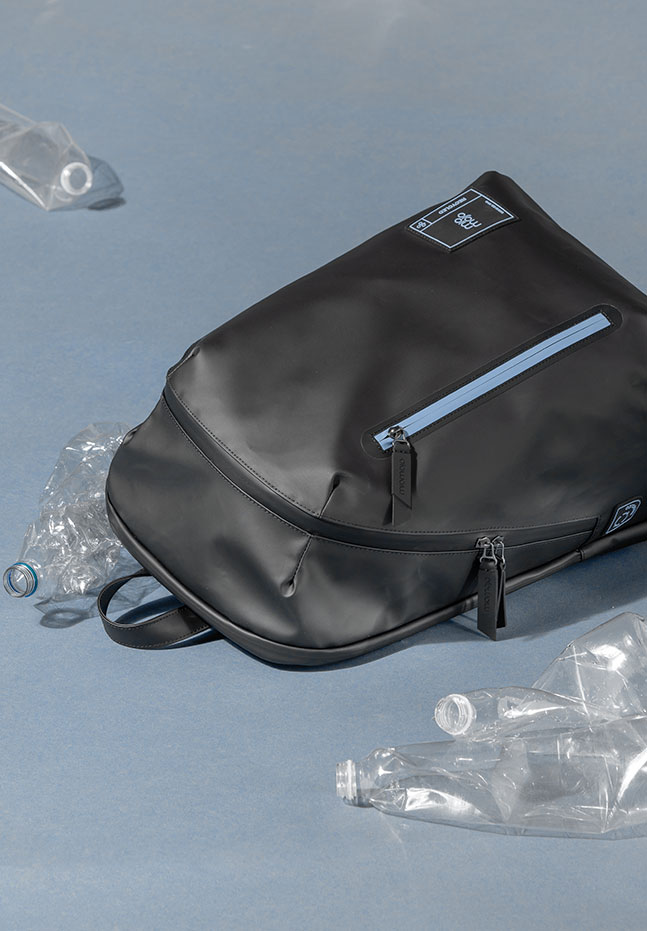
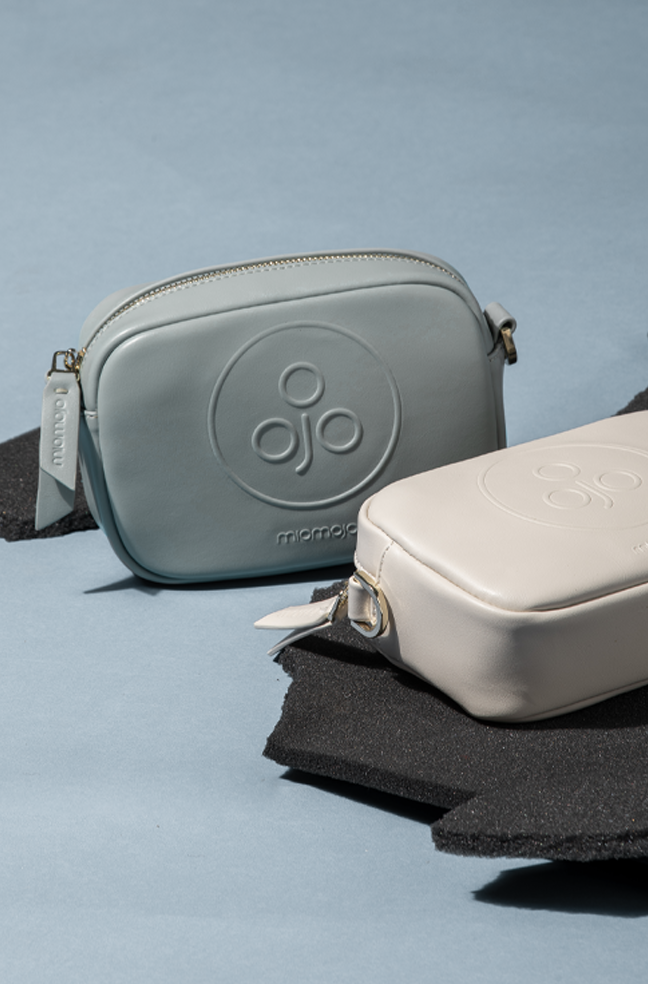
MADE FROM
Recycled PU
In the same spirit as all the other recycled materials we use, we try, as far as possible in everything we do, to avoid the production of new items using virgin resources, which cause even further depletion of what our beautiful planet has to offer.
We only have one planet. The Earth was formed about 4.5 billion years ago and modern humans have existed
for about 315,000 years. According to a study by the World Wildlife Fund (WWF), more than a third of Earth’s natural resources have been destroyed by humans in just thirty years.
Not only has humanity used up a third of nature’s resources; our consumption continues – at an increasing rate.
Today, we would need about 1.75 planets to provide the resources to sustain our consumption and absorb our waste. By 2030, we would need 2 planets. We have only one.
As a consumer, you have the chance to make a positive difference. Let’s buy less and buy better! Let’s choose beautiful products made from recycled materials!
This very soft and durable RE-PU is made from 60% post-consumer recycled polyester and pre-consumer recycled PU (upcycled waste).
Like all our recycled materials, this one is also GRS-certified. Global Recycled Standard (GRS), is the gold standard for products obtained from recycled materials and manufacturing activities. It is awarded for products made from recycled materials, in compliance with environmental and social criteria that extend to all stages of the production chain.




